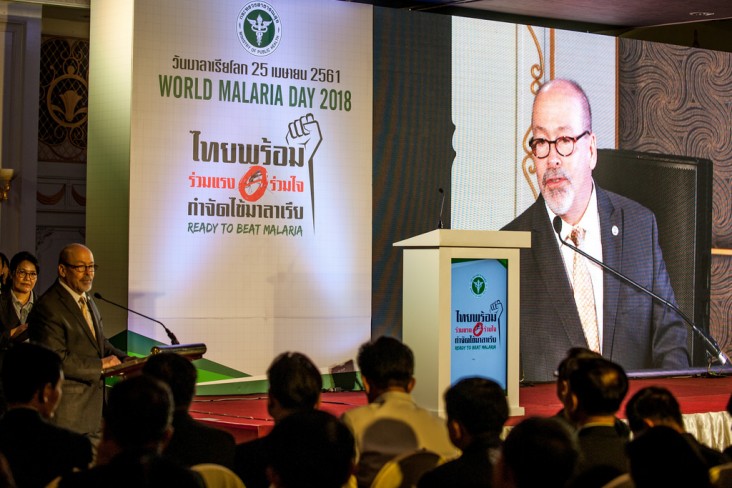Speeches Shim

It is my great pleasure to join you here today to celebrate the many achievements of the Ministry of Public Health on malaria control and elimination, and to join in the announcement that 35 provinces in Thailand have achieved malaria elimination.
I am particularly pleased to be a part of this important event given my own history with malaria. Forty years ago, when I was beginning my career with USAID, I brought my young family to West Africa. We were in a country that had practically no medical care at the time.
When my 10-month old son – our first child – came down with malaria, my wife and I didn’t know where to turn. As his temperature reached dangerous levels, I remember holding him against my chest and spending long periods of time in a bathtub filled with cold water. We simply didn’t know what else to do, and feared we could lose our son. But thankfully he recovered.
Later, I fell seriously ill; a military para-medic thought I had meningitis and filled me with morphine, with little more to offer. Fortunately, my boss at the time hired the only plane in the country, an old DC-3, and flew me and my family to Senegal where I was diagnosed and treated for falciparum, cerebral malaria. The doctor in attendance told me I would not have survived another day without treatment.
Clearly, I have great appreciation for the work you do, and understand the importance on a very personal level. So again, I want to commend the Royal Government of Thailand’s commitment to fighting malaria as evidenced by the great progress you have made to date, and for your continued efforts to eliminate malaria by 2026.
This year marks the 200th anniversary of the longstanding friendship between the Royal Government of Thailand and the United States of America. In an 1862 letter to His Royal Majesty King Rama IV, then U.S. President Abraham Lincoln referred to our two nations and our people as “Great and Good Friends.”
That friendship has grown over the years in trade, cultural exchanges, and so much more. In the health sector, we began to work together in 1951, with the establishment of Thailand’s Malaria Control Program -- at a time when malaria was the leading health-related cause of death in Thailand. The United States Government is honored to have been a partner from the beginning in this fight against malaria and today reaffirms that we are, as the international slogan this year states, “Ready to Beat Malaria” working together with all of you.
Results to date in Thailand have been impressive -- reported malaria cases have decreased 68 percent since 2011, as last year Thailand reported only 14,000 malaria cases as compared to 44,000 in 2011. The number of villages with malaria transmission has also decreased 56 percent.
The U.S. Government, through the U.S. President’s Malaria Initiative – referred to as PMI – has united USAID, the U.S. Centers for Disease Control and Prevention (CDC), and our Department of Defense and the Department of State to assist and support Thailand’s Malaria Elimination Strategy.
In support of this effort, PMI has provided technical assistance through “USAID Inform Asia,” which is implemented by RTI International, to integrate all malaria data into one comprehensive national malaria information system that is online and in real-time. PMI will continue to support training for health workers and other non-health sectors to detect and respond appropriately to malaria cases, especially as malaria continues to decline.
The threat of drug resistance to current antimalarial drugs remains an imminent challenge for Thailand and the region. Working with WHO through PMI support, Thailand is taking the lead to pilot Integrated Drug Efficacy Surveillance to ensure that treatment outcomes of all malaria cases are monitored. And importantly, this approach will serve as a model for other malaria-eliminating countries in the region and beyond.
The fight against malaria requires a steady and united effort. And we must acknowledge the hard work of the volunteers, health workers, and community members dedicated to eliminating malaria, as well as the outstanding leadership and commitment of the provincial governors here today.
On World Malaria Day -- and every day, the U.S. Government joins the concerned global community and stands “Ready to Beat Malaria.” We recognize and commend Thailand’s commitment to eliminate malaria over the next six years. We will be at your side all the way. We wish you the best of success in this important endeavor for this great country – and for the region.

Comment
Make a general inquiry or suggest an improvement.